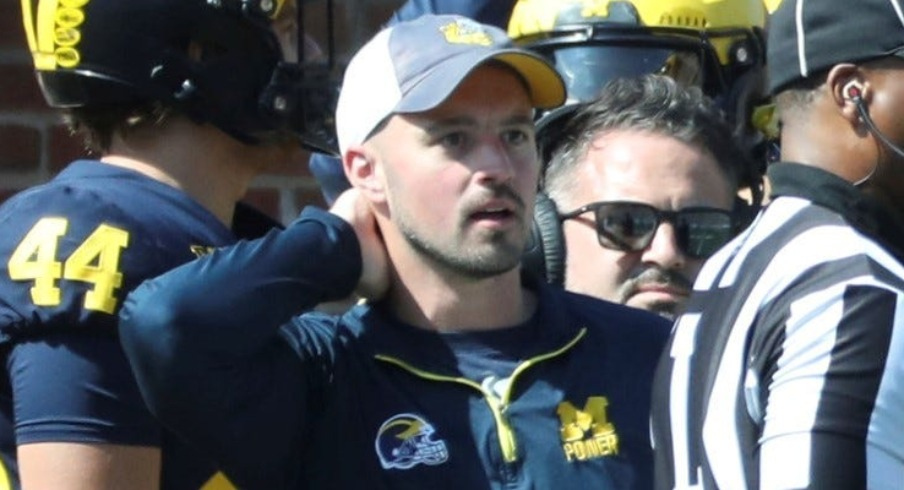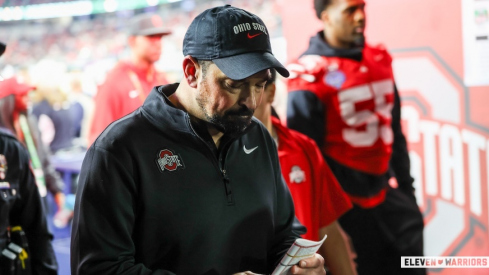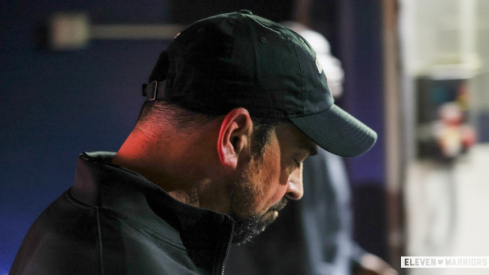For as polarizing a figure as Dave Portnoy can be, the Barstool Sports founder was the central figure of one of the most telling moments in Netflix's look at Connor Stalions.
Untold: Sign Stealer released on Netflix at 3 a.m. on Tuesday, telling Stalions' side of the scandal that rocked college football last year. Roughly midway through, the documentarians are showing Stalions the famed photo of an unidentified staffer on Central Michigan's sideline – who is allegedly Stalions – doing advanced scouting of Michigan State.
Stalions' lawyer, Brad Beckworth, took the neither confirm nor deny approach when asked about the photo. The scene then cut back and forth between Stalions and Portnoy.
"Well, I know the answer to that because he told me," Portnoy said, the "that" in question being whether the photo is of Stalions on Central Michigan's sideline.
It cuts back to Stalions, who looks at the photo with a smirk and a laugh, then cuts to Portnoy again.
"Yeah, that was Connor on the sidelines. That was Connor on the sidelines," Portnoy stated bluntly.
"I don't even think it looks like me," Stalions said after the camera switched back to him one last time.
NEW: @TheAthletic has obtained more photos of the goatee'd sunglasses person on the Central Michigan sideline at Michigan State.
— Chris Vannini (@ChrisVannini) October 31, 2023
CMU is looking into whether this is Connor Stalions.
Story: https://t.co/79siEcZ89r pic.twitter.com/R5AyslTIWF
Such interactions were commonplace for a man who refused to admit he broke any rules while it was dictated exactly how he broke the rules in a 90-minute documentary told from his perspective. Perhaps Stalions' greatest backpedal came when he was hit with questions about why tickets were purchased in his name to more than 30 Big Ten games – including 12 Ohio State games – all around the 50-yard line.
At first, Stalions said he hooked his friends and family up with tickets for fun because they were college football fans, as a Marine Corps friend named Zachary Couzens and his mother claim. Stalions slyly remarks that he supposes he's in trouble for sending his mother to watch a Michigan State game.
The documentary shows evidence that Michigan staffers and non-Michigan coaches were also at games in Stalions' name, a swath of it obtained with the help of Eleven Warriors' own forum poster and vigilante investigator, Brohio, who is decked out in all black with a black mask and orange mirrored sunglasses for his interview.
"This is the first time that everything I was seeing on message boards ended up being true," NBC Sports' Nicole Auerbach said in the documentary. "And it was so unusual because you would hear something or see something that seemed so outlandish, and then it would turn out to be actually part of this story."
The evidence against Stalions included public transactions on Venmo between Stalions and people he was sending to games, but Stalions claimed he was paying his success forward in some way.
Stalions doc is throwing 105mph heat!!! pic.twitter.com/xEjO5Fz1pm
— Josh Pate (@JoshPateCFB) August 27, 2024
"I've profited quite a bit off of buying and selling tickets as well," Stalions said in the documentary. "So to me, if a friend wants a hundred-dollar ticket, sure."
Brohio was quick to point out that such premium midfield seats at many of the games Stalions purchased were worth far more than $100, but that topic laid dormant until the final 10 minutes of the documentary.
The film concludes by showing Stalions' interview with NCAA investigators in April. He at first echoed he had no wrongdoing, but after being pressed with several questions, he admits to NCAA investigators that he received film of opposing sidelines from the friends and associates he put in future opponents' seats.
Stalions still told Netflix's filmmakers that he didn't do any advance scouting, however. He claims that even though he possessed footage of opposing sidelines, he only scouted off television broadcasts.
"It's kind of like when your aunt gets you a Christmas present that you already have," Stalions said. "You're not gonna be rude and be like, 'I already have this, I don't need it.' (You say) 'Oh thanks, appreciate it.' They feel like they're helping out or whatever. I already had the signals. I already had memorized the signals. So I just say 'Thanks, whatever.'"
As the documentary makes clear, sign stealing is not against NCAA rules. Stalions dives into his talent for sign stealing, his catalogue of thousands of signals he recorded himself motioning. It's clear his military background and fervent dedication to deciphering signals, which he honed under coach Ken Niumatalolo at Navy, made him a prolific sign-stealer.
But even if Stalions' story is to be believed, that he obtained and coordinated premium seats for his friends and some coaches to dozens of Big Ten games just to hook his pals up, and that when those pals sent him footage he did not make a clear effort to reject or delete it but only didn't use it because he didn't need it, that's still a staffer obtaining video footage of a future opponent's sideline.
And as Washington Post reporter Will Hobson points out, that story seems pretty unlikely.
"So why were all these Michigan interns and his buddy from the Navy, why were they going to opposing games and videotaping opposing coaches? Just for their own personal interest?” Hobson said in the documentary. “I do not find it plausible that his sign analysis was based solely on game footage.”
Asked by the NCAA whether he was at the Central Michigan vs. Michigan State game, Stalions once again deflected by saying "I do not recall." Seeing that last statement cut together with the earlier Portnoy interaction is bewildering.
NCAA : Connor did you attend the central michigan michigan state game on sept 1 of 23
— Official Ohio State DG (@DylanEveryday) August 27, 2024
Connor : I dont recall attending a specific game
Dave Portnoy: Yea I know the answer to that because he told me. Um Yea that was Connor on the Sidelines! That was connor on the sidelines!! pic.twitter.com/RLLcjuOZ6Z
Stalions' lawyers jumped in afterward to try and shift blame to Ohio State, accusing the Buckeyes of being responsible for a "data breach" on Stalions' computer, before ending the interview with the NCAA.
It's still unclear how the investigative firm that initially turned evidence of sign-stealing over to the NCAA obtained the evidence they obtained, or why they were looking into Michigan's computers in the first place. But it's another deflection in a documentary overflowing with them.
"Whoever hired them doesn't change the fact that the evidence was what the evidence was," Hobson said.
Stalions' concluding statement in the documentary is "I don't break the rules, I exploit them," but the evidence presented throughout the nearly 90-minute film suggests otherwise.
Michigan received its official Notice of Allegations from the NCAA on Sunday. Stalions is now a defensive coordinator at Mumford High School in Detroit.


